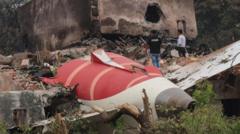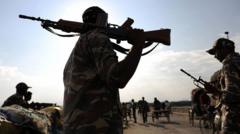The terrorist attack in Kashmir has led to widespread detentions and property demolitions targeting Muslims, fueling fears of a growing backlash from right-wing Hindu nationalists. Activists warn of ongoing harassment framed as a crackdown on illegal migrants.**
Heightened Tensions in India Following Kashmir Terrorist Attack**

Heightened Tensions in India Following Kashmir Terrorist Attack**
Rising fears among India's Muslim community as government detentions and property demolitions increase after a deadly attack near Pahalgam.**
Widespread unrest in India has been sparked by a recent terrorist attack in Kashmir, which resulted in the deaths of 26 individuals, predominantly Hindu tourists. In the wake of the attack, local authorities have intensified operations against the Muslim community, raising alarms that right-wing Hindu factions are capitalizing on the tragedy to further marginalize this demographic.
The Indian government has accused Pakistan of complicity in the attack, a claim firmly denied by Islamabad. Prime Minister Narendra Modi’s administration is reportedly considering military responses against Pakistan, with a strong emphasis given to pursuing the alleged terrorists behind the ambush. A Pakistani government minister, responding to these escalations, expressed concerns regarding the potential for imminent military action from India.
As part of the government's response, punitive actions have been taken, including a series of detentions and property demolitions, which are being viewed as systemic oppression against Muslims. Activists have noted an uptick in harassment aimed at individuals labeled as "illegal migrants," particularly those from Bangladesh and Myanmar's Rohingya minority, further indicating the politicization of national security concerns by some factions within the ruling party.
In regions governed by Modi’s Bharatiya Janata Party (BJP), local leaders have utilized the attack as a pretext to bolster anti-Muslim sentiment. This has led to numerous arrests framed under the guise of countering illegal immigration, with labels like "Pakistani" being applied broadly to stigmatize Muslim communities, regardless of their actual origins.
The converging issues of national security, anti-Muslim rhetoric, and regional geopolitics present complex challenges as India navigates the aftermath of the Kashmir attack. As the situation evolves, both national dialogue and international scrutiny will likely play crucial roles in shaping the future of communal relations within India.






















